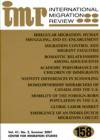This article examines how conflict in the country of origin interacts with other factors in shaping migrants’ remittance-sending practices. Our data come from a survey of 10 immigrant groups in Norway and semi-structured interviews with Somali and Pakistani remittance-senders and receivers. First, we conduct an in-depth comparison to explore the differences in how Somali and Pakistani migrants decide about remittance-sending. Second, we use survey data on all 10 migrant groups to evaluate whether the differences that are not explained by socioeconomic characteristics, may partly reflect whether or not there is ongoing conflict in the country of origin. In our analyses we differentiate between (1) the effect of migrants’capacity to remit and their prioritizing of local and transnational expenditures, and (2) the impact of state collapse and absence of human security on migrants’ and refugees’desire to remit. We find that ongoing conflict in the country of origin exerts an upward pressure on remittance-sending.
Carling, Jørgen; Marta Bivand Erdal & Cindy Horst (2012) How does Conflict in Migrants’ Country of Origin Affect Remittance-Sending? Financial Priorities and Transnational Obligations Among Somalis and Pakistanis in Norway, International Migration Review 46 (2): 283–309.









